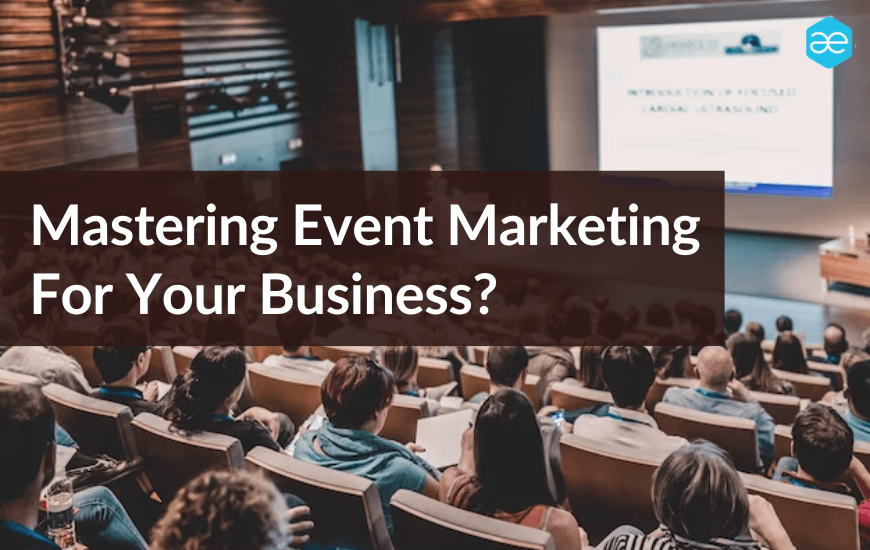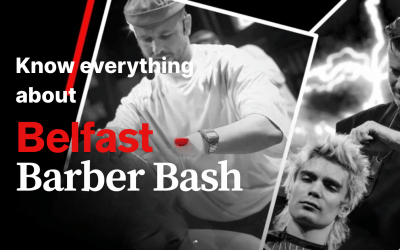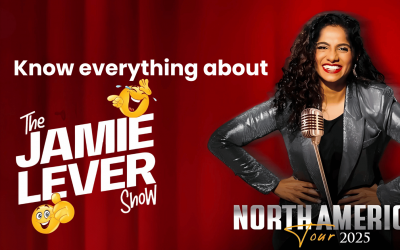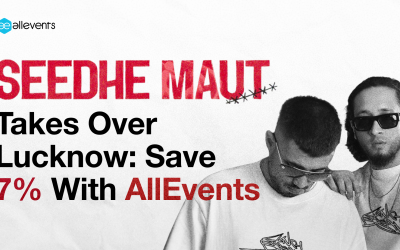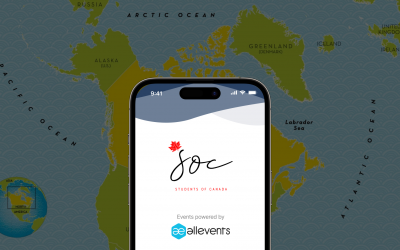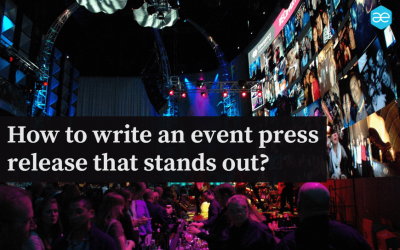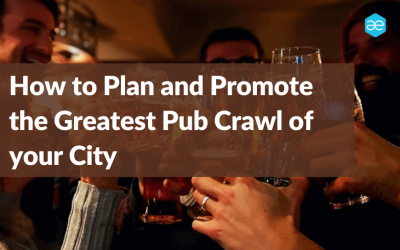Marketing an event turns it into an extraordinary experience. Whether you’re planning an epic event or using events to supercharge your business – Without the right event marketing approach, it is a lost cause!
This 2024 event marketing guide will cover every aspect of event marketing and show you all the possible ways to increase your revenue through it.
What is Event Marketing, and How Does It Help Your Business?
“Event marketing is a strategic approach that event organizers or businesses use to promote their events, brands, products, or services through live, in-person, or real-time engagements. This can include various activities such as hosting or participating in events, online or offline.”
Definition derived from – Harvard Business Review
Results Driven By Event Marketing
Event marketing is a powerful strategy that delivers tangible results. As an example, let’s look at the case of Sahil Shah. AllEvents strategically promoted event, utilizing channels such as Facebook Ads, Instagram Ads, and email marketing. The result? Over 1600 registrations, exceeding ROI expectations and opening doors to a vast audience. This is how marketing affects the outcome of an event. Organizers worldwide share similar success stories, highlighting how event marketing can boost engagement, revenue, and brand visibility.
Read more in our case study at AllEvents’ blog case study Sahil Shah.
Types of Event Marketing Explained!

Let’s keep it simple and explore different ways to market your event:
1. 3rd Party Event Discovery and Listing Platforms
Event discovery and listing platforms like AllEvents are like giant billboards in a bustling city. By listing your event there, you ensure it’s easy to spot.
People looking for events often turn to them. They have a massive user base, expanding your event’s reach. So, by being on these platforms, you tap into a ready-made audience eager to discover new events.
Some even provide tools and strategies, acting as your personal event marketing team to ensure your event shines.

2. Search Engine Marketing
Think of your event website as a digital stage. SEO helps it take the spotlight. When people search for events like yours, your site shines at the top of search results. For businesses hosting events, your website is your showcase. SEO makes it easy to find.
On event-specific platforms, SEO-friendly event pages are like a map. They lead attendees straight to your event. Even on social media, SEO guides the way. By using the right words and hashtags, your event posts rise to the top of people’s feeds, like a catchy tune everyone wants to hear.
To make sure your event gets noticed online, here’s what you need to do:
Note: Just in case you want to avoid the hassle of testing this out, we have created a Google Event Listing Tool, which will help you rank your event on Google at no cost.
- To attract more visitors, start with keyword research to find location-specific keywords (e.g., NYC Event).
- Gather all the important event details for SEO, and ensure your event info is prominently featured on Google.
- Use event plugins or third-party event websites, and if needed, manually add event schema markup to your event page.
Here is a blog to help you with this – How to Get Your Event Listed on Google?
- After that, confirm that Google displays your event correctly with the Rich Results Test tool.
- Lastly, promote your event across different platforms to earn coverage and links.
Boost your event’s visibility with Google Search Ads, a powerful tool to ensure your event reaches a broader audience. Here’s how to make the most of this promotional strategy:
- Set up targeted ads: Create ads with compelling copy and visuals that capture your event’s essence. Craft attention-grabbing headlines and descriptions that entice potential attendees.
- Monitor and adjust ad campaigns: Continuous optimization is the key to success in Google Search Ads. Keep a close eye on your ad performance. Analyze metrics like click-through rates, conversion rates, and cost per click.
Also read: Guide on SEO For Events
3. Content Marketing
Now, when it comes to promoting your event, content marketing takes center stage. Each piece of content you create, whether a blog post, a captivating video, or a catchy social media update- conveys a message to your audience. And when it’s done effectively, it can work wonders for every type of event.
To make content marketing work for your event, include storytelling about what makes your event unique. Encourage action with clear calls to action, and tailor your content to your target audience.
4. Social Media Marketing
Social media event marketing refers to using social media platforms like Facebook, Twitter, Instagram, and LinkedIn to promote your events and services. You can enhance your social media marketing by joining relevant Facebook groups and initiating event-related discussions on Twitter. This additional engagement can provide a significant boost to your online presence. Just as with B2B events, LinkedIn can be a valuable platform by joining industry-specific groups and educating them about your upcoming event and related topics.
Effective social media marketing involves various strategies, such as creating compelling content, interacting with your audience through comments and messages, running targeted advertising campaigns, and analyzing data to track performance.
5. Influencer Marketing
The effectiveness of influencer marketing lies in the trust and authenticity that influencers have built with their audience. When an influencer recommends your event, followers often perceive it as a genuine and credible endorsement. This increases brand awareness, engagement, and conversions.
For instance, it’s crucial to find influencers within the music industry rather than sports influencers when promoting a music festival. The effectiveness of influencer marketing lies in the trust and authenticity that influencers have built with their audience.
If you want to know more, check out the detailed “influencer marketing for events.”
6. Email Marketing
Email marketing is a highly effective strategy for event promotion. It involves sending targeted emails to your audience to inform them about your event and encourage them to take action, such as registering or purchasing tickets.
To succeed with email marketing, you must build a quality email list, segment it to send relevant messages, create engaging emails with clear calls to action, and use automation for timely follow-ups.
7. Using Advertising To Promote Events
Event advertising is a powerful tool for promoting events and reaching a wider audience. It involves paying to display your event information in various media channels, such as social media ads, search engines, display ads on websites, and even traditional advertising like billboards and print media.
To effectively use event advertising for event promotion, you must identify your target audience and choose the most suitable advertising platforms. Craft compelling ad creatives with clear event details and calls to action.
Set a budget and monitor the performance of your ads to optimize your strategy. With advertising, you can increase event visibility and attract attendees who might have yet to discover your event through other channels. It’s a valuable addition to your event marketing toolbox.
Want help promoting your event? Connect with our event marketing experts.

8. Affiliate Marketing
“Affiliate marketing is a collaborative strategy that involves partnering with individuals or organizations (affiliates) to promote your event. Affiliates earn a commission for each ticket sale or registration they generate through their promotional efforts.”
To do that, you need to set up an affiliate program to make affiliate marketing work for your event. This includes creating promotional materials, unique affiliate tracking links, and determining commission structures. Choose affiliates who align with your event’s target audience and have a strong online presence.
Affiliate marketing can be a cost-effective way to tap into new audiences and increase event registrations, especially with a network of enthusiastic affiliates promoting your event. It’s a win-win, as affiliates benefit from commissions, and you gain more attendees.
Event Marketing Strategies and Ideas to Drive Ticket Sales

1. Event-based strategy
Event-based strategy means tailoring your marketing approach to each event’s unique characteristics and audience. It’s like customizing a suit to fit perfectly.
Let’s take a look at what works for different types of events.
Music Event Promotion
Platforms like Instagram and TikTok are goldmines for music events. Share snappy music videos and encourage fans to create content like dance challenges or song covers.
Also read: Top Music Festival Promotion Ideas
Sports Event Promotion
When it’s a sports event, Twitter and Facebook are your MVPs. Share live updates, engage fans with sports quizzes, and consider partnering with local sports brands for added buzz.
Food Festival Promotion
If it’s a food festival, Instagram and Pinterest are your kitchen. Post mouthwatering food pics, organize tastings, and collaborate with local restaurants to sizzle up the excitement.
Here are some ideas if you want to plan it differently: Creative food festival ideas.
Tech Conference Promotion
Tech conferences thrive on LinkedIn and Twitter. Share speaker profiles, engage the tech-savvy audience with live coding sessions, and collaborate with tech companies to make your event click.
Also Read: Proven Tactics and Ideas for Conference Promotion
Charity Gala Promotion
Charity galas shine on platforms like Facebook and Instagram. Share inspiring stories, create charity challenges for attendees, and partner with nonprofits and celebrities to turn your event into a beacon of hope.
2. Merging Content Marketing and Email Marketing
Content marketing tells your story through blogs, videos, or graphics. Email marketing takes this story and delivers it to your audience’s inbox.
Content educates and entertains your audience, building a relationship. Email nurtures this bond, continuing the conversation. Together, they motivate action, add a personal touch, and gather data for smarter strategies. They work as a team to warm up potential customers, turning them into loyal clients, all while collecting valuable feedback. It’s a dynamic duo for marketing success.
3. Gamification
Gamification is like turning marketing into a game. It’s about adding playful elements to your strategies, making them engaging and exciting for your audience.
Think of it as a digital treasure hunt. You create challenges, rewards, and competitions. People participate, earn points, and win prizes. This grabs their attention and keeps them coming back for more.
Gamification works because it taps into our natural competitive instincts and desires for rewards. It’s a clever way to make marketing fun, memorable, and effective. So, if you want to level up your marketing game, consider adding a touch of gamification.
4. Event Teasers and Countdowns
Imagine you’re about to watch your favorite movie, but there’s a thrilling teaser before it starts. It gives you a sneak peek, a taste of what’s to come, and leaves you eagerly waiting for the main show.
Event teasers and countdowns do just that for your event. They create excitement, anticipation, and buzz. Teasers are like a trailer for your event, showcasing what attendees can expect. Countdowns build suspense, making people look forward to the big day.
These marketing tools are like the drumroll before the grand reveal. They’re attention-grabbing, memorable, and, most importantly, effective in boosting attendance. So, to ensure your event is a blockbuster, remember to add teasers and countdowns to your marketing playbook.
5. Guerrilla Marketing
Sometimes, the most memorable events are those that break the mold. Guerrilla marketing does just that. It’s about thinking outside the box, ditching traditional methods, and creating a buzz that’s impossible to ignore.
Imagine hosting an event in the middle of a busy street, with unexpected performances that stop people in their tracks. Or launching a social media campaign that goes viral, spreading like wildfire. Guerrilla marketing is all about surprise, intrigue, and making a lasting impression.
By tapping into this strategy, you’re promoting an event and creating an experience. It’s about being bold, unconventional, and, most importantly, unforgettable. So, if you want your event to stand out and be talked about long after it’s over, consider going guerrilla. It’s a marketing approach that’s bound to leave a mark.
Here is an example of guerilla marketing by Coca-Cola 👇
6. Partnerships and Collaborations
Events become truly remarkable when different forces come together. Partnerships and collaborations can make your event bigger, better, and more impactful.
Imagine hosting a music festival with a renowned food chain providing delicious meals or a technology company offering cutting-edge event apps. These collaborations elevate your event to new heights.
Partnerships allow you to tap into each other’s networks, resources, and expertise. It’s a win-win situation where you reach a wider audience, and your partners gain exposure and new customers.
Finding partners who share your event’s values and objectives is key. Together, you can create an event that’s both memorable and meaningful.
So, don’t hesitate to reach out and explore the endless possibilities that partnerships and collaborations can bring to your event. It’s a recipe for success that’s waiting to be tasted.
Timeline For Event Marketing
Event marketing is a journey that spans three crucial phases: pre-event, during-event, and post-event promotions. Let’s break down this timeline:
1. Pre-event promotions
This is where the magic begins. You’re like a conductor leading up to your event, setting the stage for an unforgettable performance. Pre-event promotions involve:
Announcing the Event: Create a buzz by announcing your event well in advance. Use social media, emails, and your website to let the world know what’s coming.
Early Bird Tickets: Offer special discounts to early birds. This encourages early registrations and generates a sense of urgency.
Teasers and Countdowns: Keep your audience engaged with teasers, countdowns, and sneak peeks. This builds anticipation and excitement.
2. During event promotions
When the big day arrives, your focus shifts to ensuring everything runs smoothly and attendees have a fantastic experience. During event promotions include:
Live Updates: Keep attendees and those following online updated with live posts and videos. Show them what they’re missing (or what they should be aware of next time).
Engage on Social Media: Encourage attendees to share their experiences on social media. Create event-specific hashtags and contests to boost engagement.
Immediate Feedback: Gather feedback during the event through surveys or interactive tools. Use this to improve the event in real time.
3. Post-event promotions
Once the event is over, it’s not time to rest just yet. Post-event promotions are equally crucial. This phase involves:
Thank You Notes: Express gratitude to attendees, sponsors, and partners. Make them feel appreciated and valued.
Highlight Reels: Share event highlights through videos, photos, and written recaps. Showcase the best moments and generate excitement for future events.
Early Bird for Next Time: Offer early bird tickets for your next event. This keeps the momentum going and rewards loyal attendees.
Understanding and effectively managing these three phases of event marketing will create a powerful and memorable experience for your audience, ensuring they keep coming back for more.
Event Marketing Tools That Will Save Your Time!

When it comes to event marketing, having the right tools in your arsenal can make all the difference. Here are some essential event marketing tools that can help you shine:
1. Google Event Ranking Tool
What it Does: Google event ranking tool lets you list your event on Google. This boosts your event’s visibility and makes it easier for potential attendees to find you.

2. Marketing automation platforms – AllEvents, Hubspot, Pardot
What They Do: Marketing automation platforms like AllEvents, HubSpot, and Pardot streamline your marketing efforts. They help with email campaigns, lead nurturing and tracking attendee interactions.
3. CRM (tracking attendee engagement across funnel) – Salesforce, Pipedrive
What They Do: Customer Relationship Management (CRM) tools like Salesforce and Pipedrive keep your attendee data organized. They help you understand your audience and tailor your marketing accordingly.
4. Social media management – Hootsuite, Buffer
What They Do: Social media management tools like Hootsuite and Buffer simplify managing your event’s social presence. They help you schedule posts, engage with your audience, and analyze social data.
Tips For Better Event Marketing
Event marketing is about capturing attention, building anticipation, and delivering an unforgettable experience. It can solve common problems like low attendance, lack of brand visibility, and disengaged audiences. Here are some tips to ensure your event marketing efforts hit the bullseye:
1. Create Eye-Catching Visuals: Design stunning posters, banners, and social media visuals that scream “Attend Me!”
2. Consistent Branding: Maintain a consistent color scheme, fonts, and logo placement across all marketing materials for a professional look.
3. Mobile Optimization: Ensure your event pages and marketing materials are mobile-friendly. Most attendees will access them on smartphones.
4. Compelling Headlines: Write attention-grabbing headlines and subject lines that pique curiosity.
5. Engaging Copy: Craft persuasive, concise, and engaging content. Highlight the event’s unique value proposition.
6. Embrace Storytelling: Share stories that connect attendees emotionally to your event.
7. Early Bird Offers: Launch early bird ticket sales with attractive discounts to incentivize early registrations.
8. Landing Page Perfection: Create a dedicated event landing page with precise event details, registration options, and a compelling call-to-action.
9. Social Media Buzz: Utilize social media platforms to build excitement. Create event pages, share teasers, and run countdowns.
Don’t Miss Out On:
10. Email Marketing: Develop a strategy with personalized content and timely reminders.
11. Video Marketing: Use teasers to showcase event highlights, behind-the-scenes glimpses, and speaker interviews.
12. Engagement Campaigns: Encourage audience participation through contests, polls, and interactive content.
Schedule and Timelines:
13. Plan Ahead: Start marketing well in advance. Set clear milestones and deadlines for each marketing phase.
14. Event Countdown: Create a schedule for the final weeks leading up to the event.
15. Post-Event Engagement: Keep the excitement from ending with the event—plan post-event engagement strategies to gather feedback and nurture relationships.
Wrapping Up Event Marketing Guide
In conclusion, event marketing is a multifaceted process that demands clear goals, engaging storytelling, strategic timing, and diverse channels. It’s the key to making your event memorable and successful in a world full of distractions. By following these strategies, you’re on the path to event marketing excellence.
Quick Answers
What is an event marketing strategy?
An event marketing team plays a crucial role in managing various aspects of event promotion, including creating marketing materials, managing social media, handling PR, and ensuring a seamless attendee experience.
What are the 5 essential features of event marketing?
The five essential features of event marketing include careful planning, strategic promotion, active attendee engagement, data analysis for improvement, and adaptability to changing circumstances.
What is the primary goal of event marketing?
The primary goal of event marketing is to increase event attendance and overall success, which often involves achieving specific objectives like ticket sales or brand exposure.
